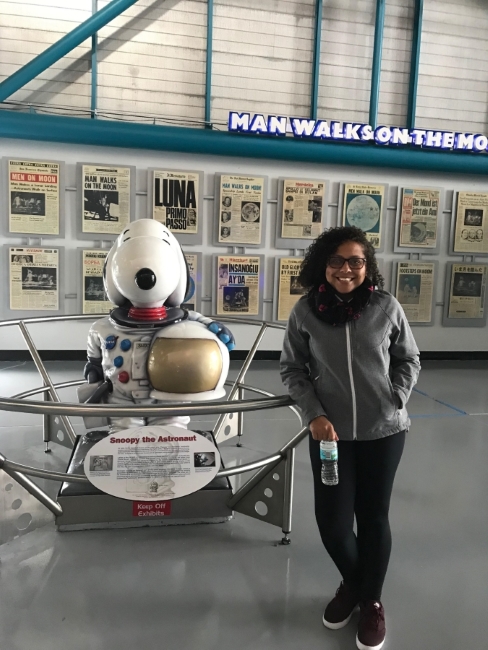Ana Carolina de Souza Feliciano is an international student from Brazil. She is collaborating with Dr. Noemí Pinilla-Alonso on the study of small Solar System bodies from an observational perspective at FSI.

Ana Carolina de Souza Feliciano
Anshare Antoine, Interviewer: What are you studying?
Ana Carolina de Souza Feliciano, Interviewee: I am studying Small Solar System bodies from an observational perspective. The samples that I analyze are Jupiter Trojans, trans-Neptunian objects, and Dwarf planets. The techniques that I use to analyze these bodies are photometry and spectroscopy in diverse wavelengths.
AA: You study at the Observatório Nacional in Rio de Janeiro, Brazil. How does it differ from a traditional graduate university?
ACSF: The traditional universities in Brazil have undergraduate and graduate levels, but the Observatório Nacional only has graduate levels (masters and PhD) in astronomy and geophysics.
AA: Can you tell me a little bit about the seminar talk you gave at the University of Northern Arizona?
ACSF: I visited the Northern Arizona University in October and gave a seminar talk about the Lucy NASA mission targets that I studied in my recent work (https://doi.org/10.1016/j.icarus.2019.113463). The Lucy mission will be launched next year and will visit 6 objects: 1 asteroid (Donaldjohanson) and 5 Jupiter Trojans (Eurybates, Orus, Polymele, Leucus, Patroclus and Menoetius). I observed and analyzed data from Donaldjohanson, Orus, Eurybates, Leucus, and Polymele. When I visited the NAU, I talked about those targets.
AA: How did you hear about FSI and why did you want to work here?
ACSF: I learned about this institution through the CAPES Sandwich Doctorate program in Brazil. Last year, I received 6 months funding to work with a researcher who has a high scientific impact in my area of study, and this researcher is Dr. Noemí Pinilla Alonso. Therefore, I came to FSI to collaborate with her. This year, she invited me to do a new job so I came for another 4 months.
AA: What do you enjoy about working with FSI so far?
ACSF: FSI is a scientific environment that inspires research. In addition to its excellent physical structure, colleagues are always willing to help. I really enjoy working here.
AA: What do you miss most about Brazil right now?
ACSF: Central Florida is a fairly Latin space, so it’s not hard to find some Brazilian food here. However, although internet access facilitates communication, what I miss is the contact with my family, friends, and boyfriend, especially on weekends and for specific foods (Feijoada: I miss you too much) LoL!
